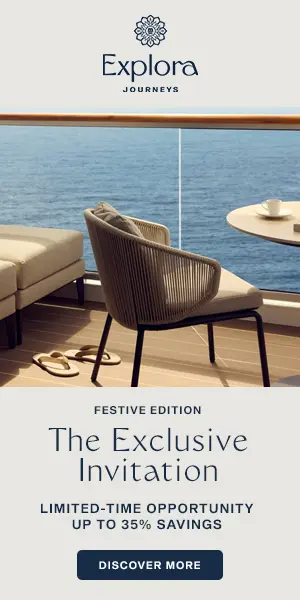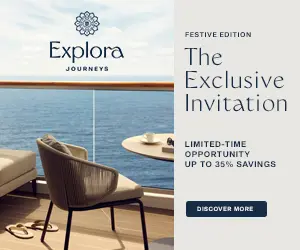Catching Up with Execs from Royal Caribbean, Norwegian Cruise Line, & Princess Cruises
by Dori Saltzman
Photo: CLIA
Over the past two months, Travel Market Report has attended a number of industry conferences including the ASTA River Cruise Expo, Seatrade Global Conference, and CLIA’s Crusie360. At each, we had a chance to sit down with executives from a number of cruise lines to talk about a range of topics.
In the second of this two-part piece, we’re rounding up some of what we talked about with each executive.
Royal Caribbean International
Travel Market Report sat down with Royal Caribbean International’s senior vice president of sales, trade support and service Vicki Freed at this year’s CLIA Cruise360 conference. With Royal Caribbean’s next Oasis-class ship, Utopia of the Seas, coming out in July and going straight into the short cruise market, TMR asked Freed about the line’s all-in investment on short cruising.
“Short cruises really are the on-ramp to new-to-cruise,” Freed told us.
It’s especially great for the new-to-cruise person who is anxious about the idea of cruising in general. Instead of a seven-night cruise a three- or four-night cruise feels more manageable. To ensure they have a great time and come back – either for more short cruises or upgrade to a one-week cruise – they’ve got to be wowed. And that’s where a new ship – like Utopia of the Seas – comes in.
“You want to wow them with a great first impression,” Freed said.
It’s why Royal Caribbean put Allure of the Seas into the short cruise market last year.
But short cruises aren’t only good for new to cruise. They’re also great for time-strapped families or friend groups who want to travel together, which in turn helps advisors grow their “net of prospects,” Freed added.
“It’s a great opportunity for travel partners to expand their client base… one of the ways to have a bigger net is to focus on short cruises because people like to travel in clusters.”
Freed also added that Royal Caribbean has seen a change in consumer behavior coming out of the pandemic.
“Many want to do shore vacations and many of them, multiple short vacations. Short cruise lends itself to that in a really beautiful way because people can cruise two, three, four times a year, on a short weekend getaway and not have used all their vacation time.”
When asked if she thought there was any trade off when it comes to earning potential with selling short cruises, Freed was emphatic that there’s plenty of money to be made.
“If you look at the pricing on short cruises, what we’re selling a short cruise for now is more than some cruise brands are selling a seven-night cruise… The commission dollars are pretty nice, and then when you sell multiple people – the cluster effect – or groups, little groups add up to big commission dollars.”
Royal Caribbean already has two ships – Allure of the Seas and Freedom of the Seas – doing short cruises. With the addition of Utopia of the Seas, that’s another 15,000 people a week the cruise line has to source.
“Thank goodness we have a great relationship with travel advisors because they’re going to help us find those people. We lean on the travel advisors to really help support our brand,” Freed said.
Norwegian Cruise Line
Travel Market Report also sat down with Norwegian Cruise Line’s senior vice president of North American sales John Chernesky at Cruise360, just a few weeks after the line’s no NCF program officially came to an end. (Though as Chernesky pointed out, any bookings made prior to April 1, 2024 for sailings into 2024, 2025, and 2026 will still receive commission on what is now non-commissionable.)
“It hasn’t rained cash on my office,” he joked, when asked where the money that had been invested in the No NCF program is going now. “We’ll have a big announcement about that [the booking engine] coming up… there’s been a lot of work behind the scenes and it’s really ramping up to ensure it’s the best booking engine in the industry.”
Some of the reinvestment has also gone into how NCL manages its air systems and communicated the BOGO air promotion – something he said they’ve been working on for several months.
“It’s everything from the backend systems, the user functionality of how you make that booking with air, but also the educational awareness, that you’re selling it to the right consumer… the BOGO air is a great deal but not everybody wants it.”
One new investment that NCL already announced is NCL Connect, a co-branded website system that allows advisors to create co-branded NCL.com-style looking websites.
“It’s not actually NCL.com. It’s a version that every lead, every click-through goes back to the advisor,” Chernesky explained, adding he’s heard “really good” anecdotal stories from people shocked at how easy it is.
As for what’s next in terms of investments in the travel advisor channel, Chernesky said, “We’ll see where the future brings us. Most of it will probably fall on the marketing side to really drive consumer demand.”
When it comes to how Chernesky and his team decide what to invest their time and money in, he told TMR that it’s a combination of internal priorities and feedback from advisors. It was loud feedback from advisors that prompted the line to work on its air system and BOGO marketing.
“The feedback from travel advisors on air was invaluable… that was the most vocal point of being challenging to work with. And our goal is to be the easiest to work with. I truly mean that. If we’re not easy, let us know. It may already be on our list and if it’s not, we’ll add it to the list.”
Princess Cruises
Finally, TMR also met up with Princess Cruises’ vice president of sales Carmen Roig at Cruise360. Much of our conversation centered on the ways in which travel advisors can take small risks to reap big rewards, but we also talked about another topic that scares advisors – artificial intelligence.
Roig isn’t worried about A.I. at all.
“Post Pause, more than ever the data shows that at all levels, it doesn’t matter what your demographics are, based on post-COVID, people will do research but they still want to talk to a human being and an expert,” she said. “Because if you’re stuck having booked something through a dot com, good luck trying to communicate… fortunately, for our travel partners, that makes their value exponentially more important. Because they are truly the experts.”
Roig compares the fear of A.I. that some advisors have to the fear that advisors often have that cruise lines plans to cut out the trade and only take direct bookings. In her mind, neither are a real threat.
“We will never leave travel partners. There is such a value to our distribution channel, that experience and expertise… Same thing with A.I.”




























